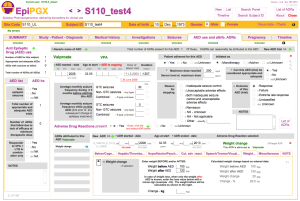 The treatment options for epilepsy must undoubtedly be improved. More than 20 antiepileptic drugs are licensed but in 30% of patients seizures are not controlled, despite treatment with a number of anti epileptic drugs and the response to medication is difficult to predict. Antiepileptic medications can cause severe adverse reactions and increase the risk of fetal malformations in women taking them during pregnancy. The differences in drug response and the occurrence of rare adverse reactions are believed to be caused by variants in the genetic makeup of individuals. Knowledge of these variants would help us to predict drug response and adverse drug reactions. This personalized treatment would help us to select medications for each individual.
The treatment options for epilepsy must undoubtedly be improved. More than 20 antiepileptic drugs are licensed but in 30% of patients seizures are not controlled, despite treatment with a number of anti epileptic drugs and the response to medication is difficult to predict. Antiepileptic medications can cause severe adverse reactions and increase the risk of fetal malformations in women taking them during pregnancy. The differences in drug response and the occurrence of rare adverse reactions are believed to be caused by variants in the genetic makeup of individuals. Knowledge of these variants would help us to predict drug response and adverse drug reactions. This personalized treatment would help us to select medications for each individual.
EpiPGX is a collaborative project funded by the European Commission with the aim of identifying genome-based biomarkers for patient stratification and pharmacogenomic strategies. It brings together experts in the field of epilepsy, genetics, pharmacology, and bioinformatics from several European countries. In the past year, the project has extended its collaboration with other international consortia.
Major efforts are currently being made within EpiPGX to assemble cohorts of people who respond to medication early or late, who are resistant to medication, who develop adverse drug reactions, and women who have offspring with developmental malformations. Over 12 000 people have consented for the project across the consortium and agreed to contribute a sample of blood for DNA extraction. Genome-wide genetic analyses are currently being performed, comparing hundreds of thousands of genomic variants in people with different outcomes of treatment.
With adverse reactions and drug-resistance being frequent aspects of epilepsy treatment, many of the clinical centres participating in EuroEPINOMICS will have encounter patients that might benefit in the long run from pharmacogenomic studies. Large samples sizes are required to perform meaningful analyses of complex phenotypes and the project is open to partner with additional centres. If you have samples that would could be included in such a study and benefit from the infrastructure EpiPGX has in place, please contact Sanjay Sisodiya.



Pingback: How to become a pediatric neurologist | Beyond the Ion Channel